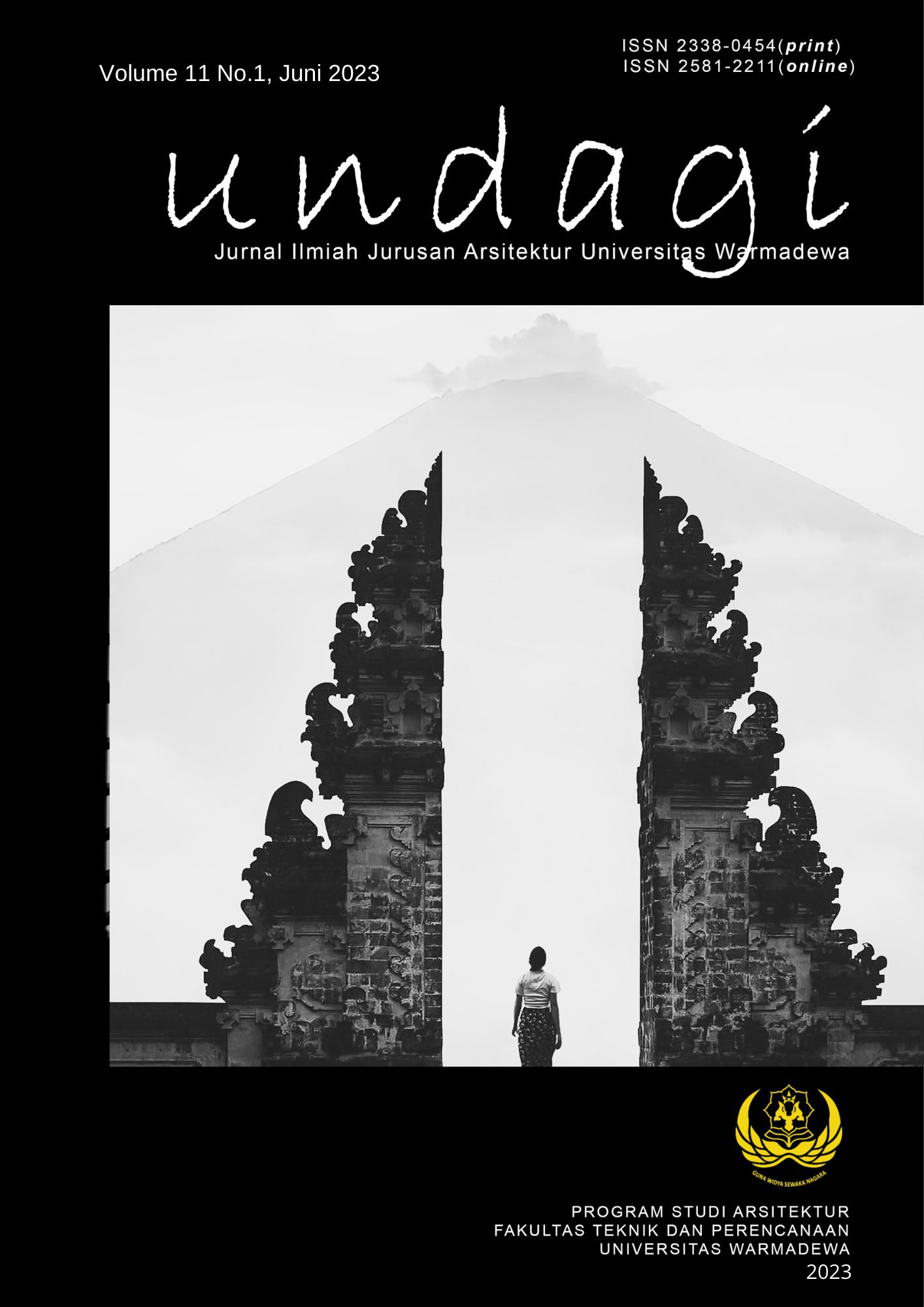Penerapan Tema Green Architecture pada Agrowisata Kopi Arabika di Desa Belantih, Kintamani
Bahasa Indonesia
Abstract
Agrotourism is a non-formal education effort for the local community as well as tourists who make tourist visits. Learning that takes place in agro-tourism is needed because it can support the learning process carried out in schools to deepen learning and have an impact on increasing academic understanding. Kintamani Arabica coffee in terms of quality and taste has been recognized by coffee connoisseur countries in the world. Belantih Village, which is in the Kintamani District, is one of the producers of Arabica coffee, in which every Banjar/Dusun has Subak Abian and farmer groups that regulate Arabica coffee farming activities, one of which is the Dharma Kria farmer group. The Dharma Kria farmer group is a farmer group in Banjar Luahan, Belantih Village which was formed in 2015 with 34 members. In the current era, in Bali coffee is increasingly being enjoyed by various groups. The increasing existence of coffee in Bali can be seen from the facilities of coffee shops in Bali, especially in the Kintamani District, which are increasing, however, there are still many who do not understand Kintamani Arabica coffee. Facilities that provide education and recreation that can be reached by various groups are urgently needed to accommodate tourists who want to learn more about the process of Kintamani Arabica coffee beans starting from the history of Kintamani Arabica coffee, planting, picking, processing, and serving Arabica coffee itself. Recreational activities can be carried out by spreading educational facilities at several points so that tourists feel the sensation of walking in the middle of the residents' coffee plantation area which has a cool climate. Data collection methods used include literature studies, field observations, and surveys
References
Andri Wahyudi, K. Y. (2021). Andri Wahyudi , Khoirul Yahya. XIV(02), 281–293.
Annisa Gemilang, Huda Nurjanti, A. F. B. (2021). Zonasi Agrowisata Kopi Sumedang Sebagai Upaya Konservasi Lahan Danau Sunyanyuri dan Perkebunan Kopi Rakyat. Composite: Jurnal Ilmu …, 03(2), 68–77. http://ejournal.uicm-unbar.ac.id/index.php/composite/article/view/361%0Ahttp://ejournal.uicm-unbar.ac.id/index.php/composite/article/download/361/211
Ghurotul Muhajjalin, M. G. (2020). KAJIAN KONSEP ARSITEKTUR HIJAU PADA BANGUNAN MUSEUM GEOLOGI, STUDI KASUS : MUSEUM GEOLOGI BANDUNG. Jurnal Arsitektur ZONASI, 3(2), 211–219. https://doi.org/10.17509/jaz.v3i2.24898
Ghozali, F. I. (2022). Pusat Edukasi Dan Rekreasi Kopi Arabica Sinsu Dengan Penekanan Arsitektur Berkelanjutan. Journal of Economic, Business and Engineering (JEBE), 3(2), 250–254. https://doi.org/10.32500/jebe.v3i2.2637
I Made Artha Mahendra, Agus Kurniawan, I. W. W. S. (2021). Undagi : Jurnal Ilmiah Arsitektur Universitas Warmadewa. 9(1), 105–113. https://ejournal.warmadewa.ac.id/index.php/undagi/index
Karlina Hangesti Rahayu, Rachmadi Nugroho, A. H. (2017). Agrowisata Kopi Di Kledung Kabupaten Temanggung Dengan Pendekatan Arsitektur Ekologi. Arsitektura, 14(2). https://doi.org/10.20961/arst.v14i2.9042
M. Sarjan, Lalu Ishadi Darwinata, Septia Antasari, Bambang Setiadi Azhari, Achmad Wiranadi Hakim, M. T. D. S. (2021). Kebun Kopi Arabika Sembalun Bumbung Sebagai Alternatif Destinasi Agrowisata. Jurnal Pengabdian …, 4(3), 30–37. http://jppipa.unram.ac.id/index.php/jpmpi/article/view/872
Maridelana, Vanya Pinkan, Yuli Hariyati, E. B. K. (2014). Profit Function of Farm Folk Coffee in Belantih Village Kintamani Sub-District Bangli Regency. 1, 47–52.
Nurul Adi Utami, Wiwik Setyaningsih, Y. W. (2020). Penerapan Arsitektur Ekologis pada Perencanaan Agrowisata Kopi di Desa Serang, Purbalingga. Jurnal SENTHONG 2020, 3(1), 136–145.
Nurul Asiah, Chelsea Epriyani, Ari Kurnia Kurnia Ramadhan, Steve Ganiputra Hidayat, dan A. A. (2022). Profil Kopi Arabika Kintamani Bali (Issue March
Copyright (c) 2023 Undagi : Jurnal Ilmiah Jurusan Arsitektur Universitas Warmadewa

This work is licensed under a Creative Commons Attribution-ShareAlike 4.0 International License.
The copyright will be filled by the author if the manuscript has been received and ready to be published and the author will get a letter of acceptance and evaluation of the manuscript from the reviewer as proof of the manuscript has passed the peer-reviewer Abstract viewed = 193 times
Abstract viewed = 193 times
 PDF (Bahasa Indonesia) downloaded = 192 times
PDF (Bahasa Indonesia) downloaded = 192 times












